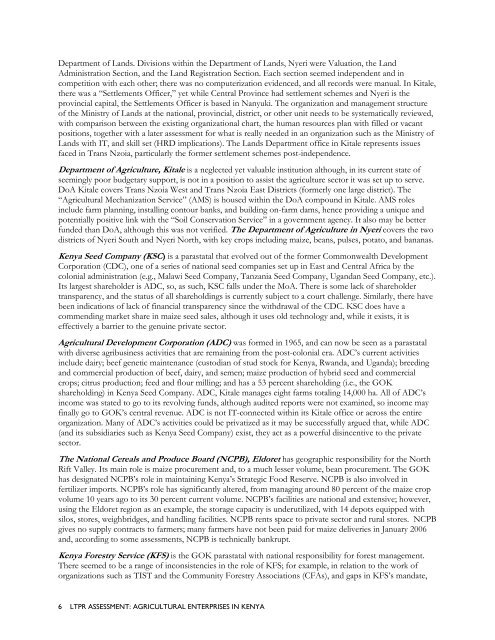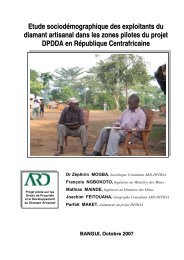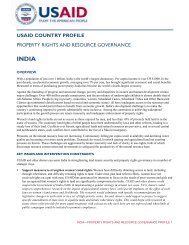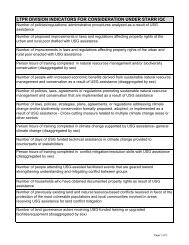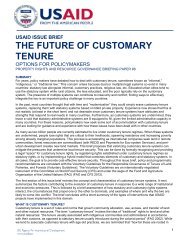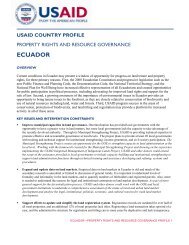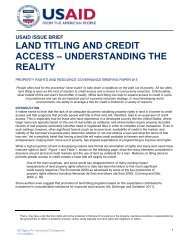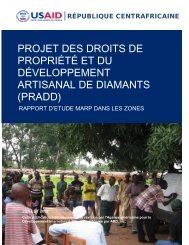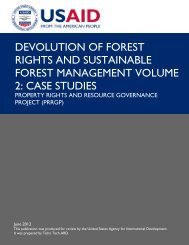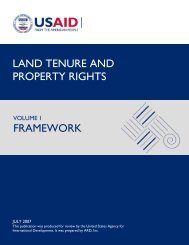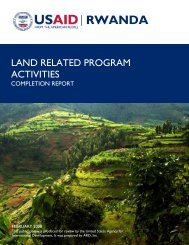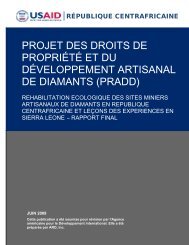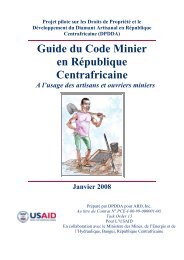Agricultural Enterprise Initiatives of USAID/Kenya - Land Tenure and ...
Agricultural Enterprise Initiatives of USAID/Kenya - Land Tenure and ...
Agricultural Enterprise Initiatives of USAID/Kenya - Land Tenure and ...
Create successful ePaper yourself
Turn your PDF publications into a flip-book with our unique Google optimized e-Paper software.
Department <strong>of</strong> <strong>L<strong>and</strong></strong>s. Divisions within the Department <strong>of</strong> <strong>L<strong>and</strong></strong>s, Nyeri were Valuation, the <strong>L<strong>and</strong></strong><br />
Administration Section, <strong>and</strong> the <strong>L<strong>and</strong></strong> Registration Section. Each section seemed independent <strong>and</strong> in<br />
competition with each other; there was no computerization evidenced, <strong>and</strong> all records were manual. In Kitale,<br />
there was a “Settlements Officer,” yet while Central Province had settlement schemes <strong>and</strong> Nyeri is the<br />
provincial capital, the Settlements Officer is based in Nanyuki. The organization <strong>and</strong> management structure<br />
<strong>of</strong> the Ministry <strong>of</strong> <strong>L<strong>and</strong></strong>s at the national, provincial, district, or other unit needs to be systematically reviewed,<br />
with comparison between the existing organizational chart, the human resources plan with filled or vacant<br />
positions, together with a later assessment for what is really needed in an organization such as the Ministry <strong>of</strong><br />
<strong>L<strong>and</strong></strong>s with IT, <strong>and</strong> skill set (HRD implications). The <strong>L<strong>and</strong></strong>s Department <strong>of</strong>fice in Kitale represents issues<br />
faced in Trans Nzoia, particularly the former settlement schemes post-independence.<br />
Department <strong>of</strong> Agriculture, Kitale is a neglected yet valuable institution although, in its current state <strong>of</strong><br />
seemingly poor budgetary support, is not in a position to assist the agriculture sector it was set up to serve.<br />
DoA Kitale covers Trans Nzoia West <strong>and</strong> Trans Nzoia East Districts (formerly one large district). The<br />
“<strong>Agricultural</strong> Mechanization Service” (AMS) is housed within the DoA compound in Kitale. AMS roles<br />
include farm planning, installing contour banks, <strong>and</strong> building on-farm dams, hence providing a unique <strong>and</strong><br />
potentially positive link with the “Soil Conservation Service” in a government agency. It also may be better<br />
funded than DoA, although this was not verified. The Department <strong>of</strong> Agriculture in Nyeri covers the two<br />
districts <strong>of</strong> Nyeri South <strong>and</strong> Nyeri North, with key crops including maize, beans, pulses, potato, <strong>and</strong> bananas.<br />
<strong>Kenya</strong> Seed Company (KSC) is a parastatal that evolved out <strong>of</strong> the former Commonwealth Development<br />
Corporation (CDC), one <strong>of</strong> a series <strong>of</strong> national seed companies set up in East <strong>and</strong> Central Africa by the<br />
colonial administration (e.g., Malawi Seed Company, Tanzania Seed Company, Ug<strong>and</strong>an Seed Company, etc.).<br />
Its largest shareholder is ADC, so, as such, KSC falls under the MoA. There is some lack <strong>of</strong> shareholder<br />
transparency, <strong>and</strong> the status <strong>of</strong> all shareholdings is currently subject to a court challenge. Similarly, there have<br />
been indications <strong>of</strong> lack <strong>of</strong> financial transparency since the withdrawal <strong>of</strong> the CDC. KSC does have a<br />
commending market share in maize seed sales, although it uses old technology <strong>and</strong>, while it exists, it is<br />
effectively a barrier to the genuine private sector.<br />
<strong>Agricultural</strong> Development Corporation (ADC) was formed in 1965, <strong>and</strong> can now be seen as a parastatal<br />
with diverse agribusiness activities that are remaining from the post-colonial era. ADC’s current activities<br />
include dairy; beef genetic maintenance (custodian <strong>of</strong> stud stock for <strong>Kenya</strong>, Rw<strong>and</strong>a, <strong>and</strong> Ug<strong>and</strong>a); breeding<br />
<strong>and</strong> commercial production <strong>of</strong> beef, dairy, <strong>and</strong> semen; maize production <strong>of</strong> hybrid seed <strong>and</strong> commercial<br />
crops; citrus production; feed <strong>and</strong> flour milling; <strong>and</strong> has a 53 percent shareholding (i.e., the GOK<br />
shareholding) in <strong>Kenya</strong> Seed Company. ADC, Kitale manages eight farms totaling 14,000 ha. All <strong>of</strong> ADC’s<br />
income was stated to go to its revolving funds, although audited reports were not examined, so income may<br />
finally go to GOK’s central revenue. ADC is not IT-connected within its Kitale <strong>of</strong>fice or across the entire<br />
organization. Many <strong>of</strong> ADC’s activities could be privatized as it may be successfully argued that, while ADC<br />
(<strong>and</strong> its subsidiaries such as <strong>Kenya</strong> Seed Company) exist, they act as a powerful disincentive to the private<br />
sector.<br />
The National Cereals <strong>and</strong> Produce Board (NCPB), Eldoret has geographic responsibility for the North<br />
Rift Valley. Its main role is maize procurement <strong>and</strong>, to a much lesser volume, bean procurement. The GOK<br />
has designated NCPB’s role in maintaining <strong>Kenya</strong>’s Strategic Food Reserve. NCPB is also involved in<br />
fertilizer imports. NCPB’s role has significantly altered, from managing around 80 percent <strong>of</strong> the maize crop<br />
volume 10 years ago to its 30 percent current volume. NCPB’s facilities are national <strong>and</strong> extensive; however,<br />
using the Eldoret region as an example, the storage capacity is underutilized, with 14 depots equipped with<br />
silos, stores, weighbridges, <strong>and</strong> h<strong>and</strong>ling facilities. NCPB rents space to private sector <strong>and</strong> rural stores. NCPB<br />
gives no supply contracts to farmers; many farmers have not been paid for maize deliveries in January 2006<br />
<strong>and</strong>, according to some assessments, NCPB is technically bankrupt.<br />
<strong>Kenya</strong> Forestry Service (KFS) is the GOK parastatal with national responsibility for forest management.<br />
There seemed to be a range <strong>of</strong> inconsistencies in the role <strong>of</strong> KFS; for example, in relation to the work <strong>of</strong><br />
organizations such as TIST <strong>and</strong> the Community Forestry Associations (CFAs), <strong>and</strong> gaps in KFS’s m<strong>and</strong>ate,<br />
6<br />
LTPR ASSESSMENT: AGRICULTURAL ENTERPRISES IN KENYA


